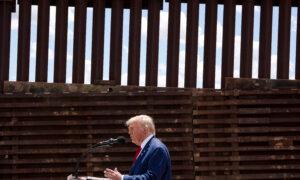A growing GOP coalition supports a two-track reconciliation process to secure border funding and extend Trump-era tax cuts.
A growing coalition of House and Senate Republicans has united around a two-step legislative strategy aimed at advancing President-elect Donald Trump’s border security and tax policy agenda in the new Congress.
Republicans plan to fast-track their proposals using budget reconciliation, a process that bypasses the Senate filibuster and requires only 50 votes for budget-related bills, unlike the usual 60-vote threshold. With a 53–47 majority in the Senate, this mechanism is seen as crucial to advancing Trump’s priorities quickly. The letter indicating growing support for the two-step process comes amid some Republican divisions over the feasibility of advancing multiple major legislative packages via reconciliation in a single year.
The coalition of House and Senate Republicans said border security funding should be the first legislative priority, with the extension of Trump-era tax cuts—set to expire at the end of 2025—to follow. These priorities, they said, are informed by Trump’s decisive victory in the November election and his pledge to voters.
“One of those promises was to secure our borders and restore the integrity of our nation’s immigration system after four years of President Biden’s open border policies,” the legislators wrote. “That is why we believe it is critical that we prioritize the prompt passage of a border security focused reconciliation bill.”
The lawmakers propose a border security package that would provide four years of funding to complete and strengthen the border wall started during Trump’s first term, hire thousands of additional Customs and Border Protection and Immigration and Customs Enforcement personnel, and expand detention and short-term holding facilities.
The proposal also includes measures to encourage self-deportation of illegal immigrants by way of significant financial penalties. It also restricts access to taxpayer-funded welfare benefits for noncitizens.
Citing fiscal responsibility, the lawmakers want the border bill to be fully offset by mandatory spending cuts and include deficit reduction measures. These would be over and above any spending reductions that Trump plans to deliver through executive action.
The second reconciliation bill would focus on preventing the expiration of the Trump tax cuts on Jan. 1, 2026, which Republicans credit with spurring economic growth. The proposal includes spending reforms, the repeal of green tax credits established in the Inflation Reduction Act, and an estimated $2.5 trillion in spending cuts that the Department of Government Efficiency initiative led by Elon Musk and Vivek Ramaswamy will identify as “necessary to restore the fiscal health of the nation.”
The coalition of lawmakers acknowledged the challenges of passing two major reconciliation bills within a single year, citing the slim Republican majority in the House and the procedural hurdles posed by the Senate filibuster. They pledged to work closely with party leadership to build the support necessary to pass both packages.
The last time that Congress enacted more than one reconciliation bill in a year was in 1997.
Original News Source Link – Epoch Times
Running For Office? Conservative Campaign Consulting – Election Day Strategies!


